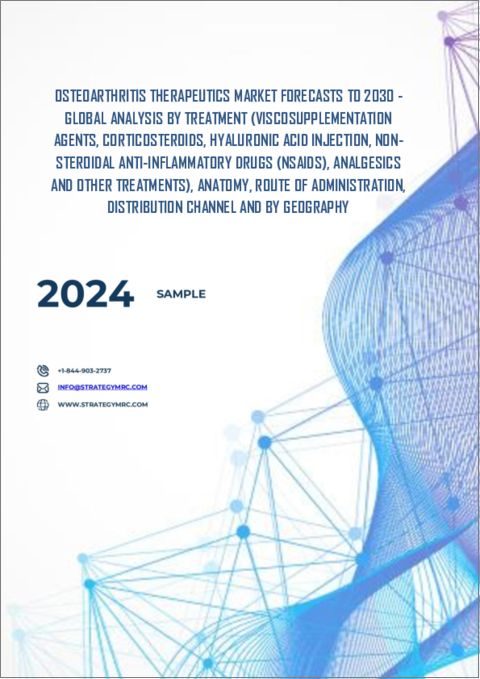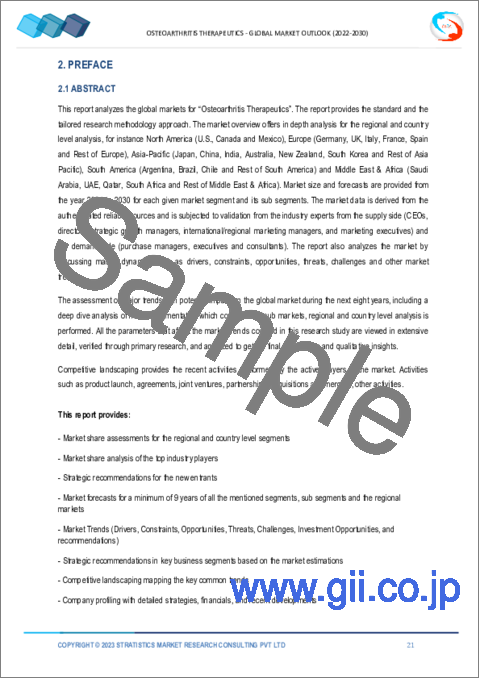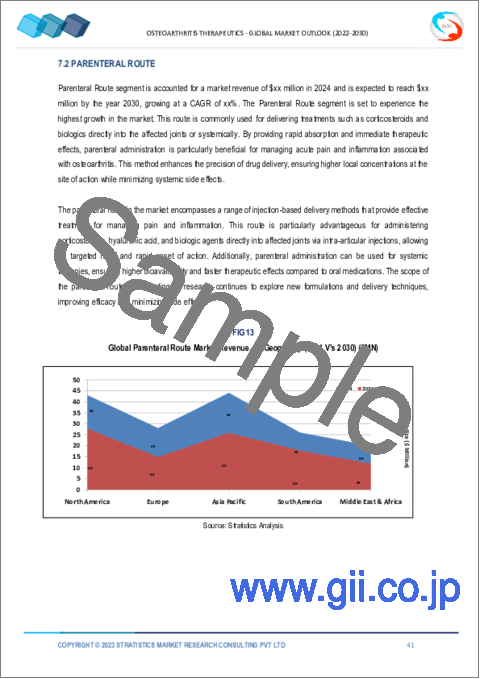|
|
市場調査レポート
商品コード
1476425
変形性関節症治療の世界市場予測(~2030年):治療法、解剖学的構造、投与経路、流通チャネル、地域別の分析Osteoarthritis Therapeutics Market Forecasts to 2030 - Global Analysis By Treatment, Anatomy, Route of Administration, Distribution Channel and By Geography |
||||||
カスタマイズ可能
|
|||||||
| 変形性関節症治療の世界市場予測(~2030年):治療法、解剖学的構造、投与経路、流通チャネル、地域別の分析 |
|
出版日: 2024年05月05日
発行: Stratistics Market Research Consulting
ページ情報: 英文 200+ Pages
納期: 2~3営業日
|
全表示
- 概要
- 図表
- 目次
世界の変形性関節症治療の市場規模は、2023年に96億米ドルを占め、予測期間中にCAGR9.7%で成長し、2030年には184億米ドルに達すると予想されています。 変形性関節症治療は、疼痛を管理し、関節機能を改善し、疾患の進行を遅らせることを目的としています。
非薬理学的介入には、運動、体重管理、理学療法などがあります。薬理学的な選択肢としては、鎮痛のためのアセトアミノフェンやNSAIDsなどの鎮痛薬があり、コルチコステロイドやヒアルロン酸の関節内注射が症状を緩和する可能性があります。グルコサミンやコンドロイチン硫酸のような疾患修飾薬も利用されますが、その有効性については議論があります。重症例では人工関節置換術などの外科的介入も考慮されます。
Lancet誌が2023年9月に発表した研究によると、2020年には世界で5億9,500万人が変形性関節症に罹患しており、アジア太平洋の有病率は10万人当たり8,632.7人でした。このような高い数値は、この地域における治療薬に対する需要の増加を示しています。
疼痛管理に対する需要の高まり
変形性関節症の痛みに対する解決策を求める人が増えるにつれ、変形性関節症治療に対する全体的な需要も増加しています。このことは、治療を必要とする患者が増えることで市場が拡大し、これらの治療を提供する製薬企業や医療提供者の収益が増加し、変形性関節症に特化した疼痛緩和薬の開発とマーケティングが行われることにつながります。これには、NSAIDsや鎮痛剤のような経口薬、クリームやジェルのような外用薬、コルチコステロイドやヒアルロン酸のような注射薬が含まれ、疼痛管理を強化し、市場の成長をさらに後押ししています。
薬の副作用
変形性関節症治療には不快な副作用や重篤な副作用が伴うため、患者は処方されたとおりに服用することが少なくなるかもしれません。その結果、痛みや炎症が抑えられなくなり、病状が悪化する可能性があり、さらに医療コストがかかることになります。NSAIDsによる胃潰瘍など、さらなる治療が必要な合併症を経験する可能性もあります。これは医療システムと個人の予算に負担をかけます。このように、薬剤の使用に一貫性がないことも治療効果を低下させ、市場全体の業績を阻害しています。
変形性関節症の有病率の上昇
変形性関節症と診断される人が増えるにつれて、治療に対する需要も当然増加し、変形性関節症を初期の段階で管理するのに役立ち、後に強力な薬物療法や人工関節置換術が必要になるのを遅らせたり、防いだりする可能性のある治療法が注目されるようになります。このことは、変形性関節症治療を提供する製薬会社や医療提供者の市場拡大につながります。
限定的な疾患改善
病気の経過を変えることができないため、リピーターが少なくありません。患者は、変形性関節症が悪化するにつれて、同じ薬や徐々に強くなる薬による継続的な治療レジメンを必要とする可能性があり、また、利用可能な治療法に対する患者の不満につながる可能性もあります。患者は、薬を使用しているにもかかわらず痛みや関節の悪化が続くため、自分の症状が効果的に対処されていないと感じるかもしれません。これは、患者と医療システムにとって経常的な費用の循環を生み出し、市場の成長を妨げることになります。
COVID-19の影響
遠隔医療と遠隔モニタリングが脚光を浴び、処方パターンに影響を与えました。症状の緩和に対する需要は持続していますが、経済的な不確実性が治療費の手頃さや治療へのアクセスに影響を与えた可能性があります。研究開発は課題に直面しましたが、特に遠隔患者管理やバーチャル臨床試験など、技術革新の機会にも恵まれました。全体としてCOVID-19は、変形性関節症治療の市場力学を乗り切る上で、適応能力、患者中心のアプローチ、回復力の重要性を強調しました。
予測期間中、関節内補充療法セグメントが最大となる見込み
関節内補充療法は、特に非ステロイド性抗炎症薬やコルチコステロイド注射のような他の従来療法に反応しないOA患者に代替治療の選択肢を提供することから、このセグメントは有利な成長を遂げると推定されます。これらの薬剤は、変形性関節症患者が利用できる治療の選択肢を多様化しています。このため、医師は個々の患者のニーズや嗜好に基づいて治療計画を立てることができるようになり、より個別化された病態管理へのアプローチが可能になりました。
予測期間中、変形性膝関節症セグメントのCAGRが最も高くなると予想される
変形性膝関節症は最も一般的な変形性膝関節症の1つであり、疼痛緩和、炎症軽減、関節機能改善をターゲットとした治療薬に対する大きな需要につながっているため、変形性膝関節症セグメントは予測期間中に最も高いCAGRの成長が見込まれます。この高い需要が、既存の治療法を革新・改善したり、変形性膝関節症に特化した新たな治療法を開発したりする製薬会社の研究開発を後押ししています。
最大のシェアを占める地域
アジア太平洋は、医療支出の増加、人口増加、医療の進歩、規制当局の支援、認知度の向上により、予測期間中最大の市場シェアを占めると予測されます。アジア太平洋は、中国、日本、インドなどの国々における人口の高齢化と治療の革新に牽引され、大きな成長を遂げると予測されます。製薬企業は製品開発のための共同研究に投資しており、また良好な規制シナリオが対症療法と疾患改善療法の両方の需要を促進しています。
CAGRが最も高い地域:
北米は、肥満の有病率の高さや政府の支援政策など様々な要因から、予測期間中に最も高いCAGRを示すと予測されます。Novartis AG、Pfizer、Zimmer Biomet、GlaxoSmithKline plcなどの主要市場企業がその地位をさらに強固なものにしています。製薬大手間の治療研究試験、合併、買収、提携などの戦略的イニシアチブは、競合情勢を積極的に形成しています。例えば、2024年2月、ノバルティスは、変形性膝関節症患者に対するカナキヌマブとLNA043の関節内投与の安全性、忍容性、有効性である生物学的介入試験のさらなる継続を発表しました。
無料カスタマイズサービス:
本レポートをご購読のお客様は、以下の無料カスタマイズオプションのいずれかをご利用いただけます:
- 企業プロファイル
- 追加市場企業の包括的プロファイリング(3社まで)
- 主要企業のSWOT分析(3社まで)
- 地域セグメンテーション
- 顧客の関心に応じた主要国の市場推計・予測・CAGR(注:フィージビリティチェックによる)
- 競合ベンチマーキング
- 製品ポートフォリオ、地理的プレゼンス、戦略的提携に基づく主要企業のベンチマーキング
目次
第1章 エグゼクティブサマリー
第2章 序文
- 概要
- ステークホルダー
- 調査範囲
- 調査手法
- データマイニング
- データ分析
- データ検証
- 調査アプローチ
- 調査情報源
- 1次調査情報源
- 2次調査情報源
- 前提条件
第3章 市場動向分析
- 促進要因
- 抑制要因
- 機会
- 脅威
- 新興市場
- COVID-19の影響
第4章 ポーターのファイブフォース分析
- 供給企業の交渉力
- 買い手の交渉力
- 代替品の脅威
- 新規参入業者の脅威
- 競争企業間の敵対関係
第5章 世界の変形性関節症治療市場:治療法別
- 関節内補充療法剤
- コルチコステロイド
- ヒアルロン酸注射
- 非ステロイド性抗炎症薬(NSAID)
- ナプロキセン
- ジクロフェナク
- アスピリン
- イブプロフェン
- 鎮痛剤
- アセトアミノフェン
- デュロキセチン
- その他の治療法
第6章 世界の変形性関節症治療市場:解剖学的構造
- 変形性股関節症
- 手の変形性関節症
- 小関節変形性関節症
- 変形性膝関節症
- 足首の変形性関節症
- その他の解剖学的構造
第7章 世界の変形性関節症治療市場:投与経路別
- 非経口投与
- 局所投与
- 経口投与
- その他の投与経路
第8章 世界の変形性関節症治療市場:流通チャネル別
- 院内薬局
- 小売薬局
- ドラッグストア
- Eコマース
第9章 世界の変形性関節症治療市場:地域別
- 北米
- 米国
- カナダ
- メキシコ
- 欧州
- ドイツ
- 英国
- イタリア
- フランス
- スペイン
- その他欧州
- アジア太平洋
- 日本
- 中国
- インド
- オーストラリア
- ニュージーランド
- 韓国
- その他アジア太平洋
- 南米
- アルゼンチン
- ブラジル
- チリ
- その他南米
- 中東・アフリカ
- サウジアラビア
- アラブ首長国連邦
- カタール
- 南アフリカ
- その他中東・アフリカ
第10章 主な発展
- 契約、パートナーシップ、コラボレーション、合弁事業
- 買収と合併
- 新製品発売
- 事業拡大
- その他の主要戦略
第11章 企業プロファイリング
- GlaxoSmithKline plc
- Sanofi SA
- Bayer AG
- Pfizer Inc
- Novartis AG
- Zimmer Biomet
- Assertio Therapeutics, INC.
- Anika Therapeutics
- Bioventus
- Ferring Pharmaceuticals Inc.
- Abbvie Inc.
- Amgen Inc.
- Boehringer Ingelheim International GmbH.
- Samsung Bioepis.
- Sun Pharmaceutical Industries Ltd.
- Teva Pharmaceuticals Industries Ltd.
- AstraZeneca PLC
- Stryker Corporation
- Merck & Co Inc.
List of Tables
- Table 1 Global Osteoarthritis Therapeutics Market Outlook, By Region (2021-2030) ($MN)
- Table 2 Global Osteoarthritis Therapeutics Market Outlook, By Treatment (2021-2030) ($MN)
- Table 3 Global Osteoarthritis Therapeutics Market Outlook, By Viscosupplementation Agents (2021-2030) ($MN)
- Table 4 Global Osteoarthritis Therapeutics Market Outlook, By Corticosteroids (2021-2030) ($MN)
- Table 5 Global Osteoarthritis Therapeutics Market Outlook, By Hyaluronic Acid Injection (2021-2030) ($MN)
- Table 6 Global Osteoarthritis Therapeutics Market Outlook, By Non-steroidal Anti-inflammatory Drugs (NSAIDs) (2021-2030) ($MN)
- Table 7 Global Osteoarthritis Therapeutics Market Outlook, By Naproxen (2021-2030) ($MN)
- Table 8 Global Osteoarthritis Therapeutics Market Outlook, By Diclofenac (2021-2030) ($MN)
- Table 9 Global Osteoarthritis Therapeutics Market Outlook, By Aspirin (2021-2030) ($MN)
- Table 10 Global Osteoarthritis Therapeutics Market Outlook, By Ibuprofen (2021-2030) ($MN)
- Table 11 Global Osteoarthritis Therapeutics Market Outlook, By Analgesics (2021-2030) ($MN)
- Table 12 Global Osteoarthritis Therapeutics Market Outlook, By Acetaminophen (2021-2030) ($MN)
- Table 13 Global Osteoarthritis Therapeutics Market Outlook, By Duloxetine (2021-2030) ($MN)
- Table 14 Global Osteoarthritis Therapeutics Market Outlook, By Other Treatments (2021-2030) ($MN)
- Table 15 Global Osteoarthritis Therapeutics Market Outlook, By Anatomy (2021-2030) ($MN)
- Table 16 Global Osteoarthritis Therapeutics Market Outlook, By Hip Osteoarthritis (2021-2030) ($MN)
- Table 17 Global Osteoarthritis Therapeutics Market Outlook, By Hand Osteoarthritis (2021-2030) ($MN)
- Table 18 Global Osteoarthritis Therapeutics Market Outlook, By Small-Joint Osteoarthritis (2021-2030) ($MN)
- Table 19 Global Osteoarthritis Therapeutics Market Outlook, By Knee Osteoarthritis (2021-2030) ($MN)
- Table 20 Global Osteoarthritis Therapeutics Market Outlook, By Ankle Osteoarthritis (2021-2030) ($MN)
- Table 21 Global Osteoarthritis Therapeutics Market Outlook, By Other Anatomies (2021-2030) ($MN)
- Table 22 Global Osteoarthritis Therapeutics Market Outlook, By Route of Administration (2021-2030) ($MN)
- Table 23 Global Osteoarthritis Therapeutics Market Outlook, By Parenteral Route (2021-2030) ($MN)
- Table 24 Global Osteoarthritis Therapeutics Market Outlook, By Topical Route (2021-2030) ($MN)
- Table 25 Global Osteoarthritis Therapeutics Market Outlook, By Oral Route (2021-2030) ($MN)
- Table 26 Global Osteoarthritis Therapeutics Market Outlook, By Other Route of Administrations (2021-2030) ($MN)
- Table 27 Global Osteoarthritis Therapeutics Market Outlook, By Distribution Channel (2021-2030) ($MN)
- Table 28 Global Osteoarthritis Therapeutics Market Outlook, By Hospital Pharmacies (2021-2030) ($MN)
- Table 29 Global Osteoarthritis Therapeutics Market Outlook, By Retail Pharmacies (2021-2030) ($MN)
- Table 30 Global Osteoarthritis Therapeutics Market Outlook, By Drug Stores (2021-2030) ($MN)
- Table 31 Global Osteoarthritis Therapeutics Market Outlook, By E-Commerce (2021-2030) ($MN)
Note: Tables for North America, Europe, APAC, South America, and Middle East & Africa Regions are also represented in the same manner as above.
According to Stratistics MRC, the Global Osteoarthritis Therapeutics Market is accounted for $9.6 billion in 2023 and is expected to reach $18.4 billion by 2030 growing at a CAGR of 9.7% during the forecast period. Osteoarthritis therapeutics aim to manage pain, improve joint function, and slow disease progression. Non-pharmacological interventions include exercise, weight management, and physical therapy. Pharmacological options encompass analgesics like acetaminophen and NSAIDs for pain relief, while intra-articular injections of corticosteroids or hyaluronic acid may alleviate symptoms. Disease-modifying drugs such as glucosamine and chondroitin sulfate are also utilized, albeit their efficacy is debated. Surgical interventions like joint replacement surgery are considered in severe cases.
According to a study published by The Lancet in September 2023, globally, 595 million people had osteoarthritis in 2020, with the Asia Pacific region accounting for a prevalence of 8632.7 per 100,000. Such high figures indicate an increasing demand for therapeutics in the region.
Market Dynamics:
Driver:
Growing demand for pain management
As more people seek solutions for osteoarthritis pain, the overall demand for osteoarthritis therapeutics rises. This translates to a larger market with more patients requiring treatment, leading to increased revenue for pharmaceutical companies and healthcare providers offering these therapies and development and marketing of pain-relieving medications specifically designed for osteoarthritis. This includes oral medications like NSAIDs and analgesics, topical applications like creams and gels, and injectable options like corticosteroids and hyaluronic acid enhancing the pain management and further boosting the market growth.
Restraint:
Adverse side effects of medications
Osteoarthritis medications come with unpleasant or even serious side effects, patients might be less likely to take them as prescribed. This can lead to uncontrolled pain, inflammation, and potentially a worsening of the condition and can lead to additional healthcare costs. Patients might experience complications requiring further treatment, such as stomach ulcers from NSAIDs. This puts a strain on healthcare systems and individual budgets. Thus inconsistency in medication use also reduces the effectiveness of the treatment, hindering the overall market performance.
Opportunity:
Rising prevalence of osteoarthritis
As more and more people are diagnosed with osteoarthritis, the demand for treatments naturally increases and focuses on treatments that can help manage osteoarthritis in its early stages, potentially delaying or preventing the need for stronger medications or joint replacements later. This translates to a larger market for pharmaceutical companies and healthcare providers offering osteoarthritis therapeutics.
Threat:
Limited disease modification
The inability to modify the disease course often leads to repeat customers. Patients may require ongoing treatment regimens with the same or progressively stronger medications as their osteoarthritis worsens and can also lead to patient dissatisfaction with available treatments. Patients might feel their condition is not being effectively addressed, as they experience ongoing pain and joint deterioration despite medication use. This creates a cycle of recurring costs for patients and healthcare systems hampering the market growth.
Covid-19 Impact
Telemedicine and remote monitoring gained prominence, influencing prescribing patterns. While demand for symptomatic relief persisted, economic uncertainties may have affected affordability and access to treatments. Research and development efforts faced challenges, but also opportunities for innovation, particularly in remote patient management and virtual clinical trials. Overall, COVID-19 underscored the importance of adaptability, patient-centric approaches, and resilience in navigating market dynamics for osteoarthritis therapeutics.
The viscosupplementation agents segment is expected to be the largest during the forecast period
The viscosupplementation agents segment is estimated to have a lucrative growth, as these agents provide an alternative treatment option for OA patients, especially those who do not respond well to other conventional therapies like NSAIDs or corticosteroid injections. These agents have diversified the treatment options available for osteoarthritis patients. This has led to a more personalized approach to managing the condition, as physicians can now tailor treatment plans based on individual patient needs and preferences.
The knee osteoarthritis segment is expected to have the highest CAGR during the forecast period
The knee osteoarthritis segment is anticipated to witness the highest CAGR growth during the forecast period, because knee osteoarthritis is one of the most common forms of OA, leading to a substantial demand for therapeutics targeting pain relief, inflammation reduction, and improvement in joint function. This high demand drives research and development efforts by pharmaceutical companies to innovate and improve existing treatments or develop new ones specifically tailored for knee osteoarthritis.
Region with largest share:
Asia Pacific is projected to hold the largest market share during the forecast period owing to the increased healthcare spending, population growth, medical advancements, regulatory support, and improved awareness. It's projected to experience significant growth, driven by aging populations and treatment innovation in countries such as China, Japan, and India. Pharmaceutical firms are investing in research collaborations for product development, and a favorable regulatory scenario, driving demand for both symptomatic relief and disease-modifying treatments.
Region with highest CAGR:
North America is projected to have the highest CAGR over the forecast period, due to various factors, including the region's high prevalence of obesity and supportive government policies. Key market players such as Novartis AG, Pfizer, Zimmer Biomet, and GlaxoSmithKline plc further solidify its position. Strategic initiatives such as therapeutics study trials, mergers, acquisitions, and partnerships among pharmaceutical giants are actively shaping the competitive landscape. For instance, in February 2024, Novartis announced further continuation of its study for biological interventions U.S., which are safety, tolerability and efficacy of intra-articular Canakinumab and LNA043 for patients with knee osteoarthritis
Key players in the market
Some of the key players in the Osteoarthritis Therapeutics Market include GlaxoSmithKline plc, Sanofi SA, Bayer AG, Pfizer Inc, Novartis AG, Zimmer Biomet, Assertio Therapeutics, INC., Anika Therapeutics, Bioventus, Ferring Pharmaceuticals Inc., Abbvie Inc., Amgen Inc., Boehringer Ingelheim International GmbH., Samsung Bioepis., Sun Pharmaceutical Industries Ltd., Teva Pharmaceuticals Industries Ltd., AstraZeneca PLC, Stryker Corporation and Merck & Co Inc.
Key Developments:
In April 2024, Novartis implements manufacturing adjustments for ribociclib to ensure alignment with latest regulatory standards in eBC by end of Q2. This does not impact patient use or commercial supply of Kisqali(R) in its approved indication of metastatic breast cancer (mBC).
In March 2024, ViiV Healthcare announces interim data at CROI indicating superior efficacy of long-acting injectable HIV treatment Cabenuva (cabotegravir + rilpivirine) compared to daily oral therapy in individuals living with HIV who have adherence challenges.
In February 2024, GSK plc announced that it has completed the acquisition of Aiolos Bio (Aiolos), a clinical-stage biopharmaceutical company focused on addressing the unmet treatment needs of patients with respiratory and inflammatory conditions.
Treatments Covered:
- Viscosupplementation Agents
- Corticosteroids
- Hyaluronic Acid Injection
- Non-steroidal Anti-inflammatory Drugs (NSAIDs)
- Analgesics
- Other Treatments
Anatomies Covered:
- Hip Osteoarthritis
- Hand Osteoarthritis
- Small-Joint Osteoarthritis
- Knee Osteoarthritis
- Ankle Osteoarthritis
- Other Anatomies
Route of Administrations Covered:
- Parenteral Route
- Topical Route
- Oral Route
- Other Route of Administrations
Distribution Channels Covered:
- Hospital Pharmacies
- Retail Pharmacies
- Drug Stores
- E-Commerce
Regions Covered:
- North America
- US
- Canada
- Mexico
- Europe
- Germany
- UK
- Italy
- France
- Spain
- Rest of Europe
- Asia Pacific
- Japan
- China
- India
- Australia
- New Zealand
- South Korea
- Rest of Asia Pacific
- South America
- Argentina
- Brazil
- Chile
- Rest of South America
- Middle East & Africa
- Saudi Arabia
- UAE
- Qatar
- South Africa
- Rest of Middle East & Africa
What our report offers:
- Market share assessments for the regional and country-level segments
- Strategic recommendations for the new entrants
- Covers Market data for the years 2021, 2022, 2023, 2026, and 2030
- Market Trends (Drivers, Constraints, Opportunities, Threats, Challenges, Investment Opportunities, and recommendations)
- Strategic recommendations in key business segments based on the market estimations
- Competitive landscaping mapping the key common trends
- Company profiling with detailed strategies, financials, and recent developments
- Supply chain trends mapping the latest technological advancements
Free Customization Offerings:
All the customers of this report will be entitled to receive one of the following free customization options:
- Company Profiling
- Comprehensive profiling of additional market players (up to 3)
- SWOT Analysis of key players (up to 3)
- Regional Segmentation
- Market estimations, Forecasts and CAGR of any prominent country as per the client's interest (Note: Depends on feasibility check)
- Competitive Benchmarking
- Benchmarking of key players based on product portfolio, geographical presence, and strategic alliances
Table of Contents
1 Executive Summary
2 Preface
- 2.1 Abstract
- 2.2 Stake Holders
- 2.3 Research Scope
- 2.4 Research Methodology
- 2.4.1 Data Mining
- 2.4.2 Data Analysis
- 2.4.3 Data Validation
- 2.4.4 Research Approach
- 2.5 Research Sources
- 2.5.1 Primary Research Sources
- 2.5.2 Secondary Research Sources
- 2.5.3 Assumptions
3 Market Trend Analysis
- 3.1 Introduction
- 3.2 Drivers
- 3.3 Restraints
- 3.4 Opportunities
- 3.5 Threats
- 3.6 Emerging Markets
- 3.7 Impact of Covid-19
4 Porters Five Force Analysis
- 4.1 Bargaining power of suppliers
- 4.2 Bargaining power of buyers
- 4.3 Threat of substitutes
- 4.4 Threat of new entrants
- 4.5 Competitive rivalry
5 Global Osteoarthritis Therapeutics Market, By Treatment
- 5.1 Introduction
- 5.2 Viscosupplementation Agents
- 5.3 Corticosteroids
- 5.4 Hyaluronic Acid Injection
- 5.5 Non-steroidal Anti-inflammatory Drugs (NSAIDs)
- 5.5.1 Naproxen
- 5.5.2 Diclofenac
- 5.5.3 Aspirin
- 5.5.4 Ibuprofen
- 5.6 Analgesics
- 5.6.1 Acetaminophen
- 5.6.2 Duloxetine
- 5.7 Other Treatments
6 Global Osteoarthritis Therapeutics Market, By Anatomy
- 6.1 Introduction
- 6.2 Hip Osteoarthritis
- 6.3 Hand Osteoarthritis
- 6.4 Small-Joint Osteoarthritis
- 6.5 Knee Osteoarthritis
- 6.6 Ankle Osteoarthritis
- 6.7 Other Anatomies
7 Global Osteoarthritis Therapeutics Market, By Route of Administration
- 7.1 Introduction
- 7.2 Parenteral Route
- 7.3 Topical Route
- 7.4 Oral Route
- 7.5 Other Route of Administrations
8 Global Osteoarthritis Therapeutics Market, By Distribution Channel
- 8.1 Introduction
- 8.2 Hospital Pharmacies
- 8.3 Retail Pharmacies
- 8.4 Drug Stores
- 8.5 E-Commerce
9 Global Osteoarthritis Therapeutics Market, By Geography
- 9.1 Introduction
- 9.2 North America
- 9.2.1 US
- 9.2.2 Canada
- 9.2.3 Mexico
- 9.3 Europe
- 9.3.1 Germany
- 9.3.2 UK
- 9.3.3 Italy
- 9.3.4 France
- 9.3.5 Spain
- 9.3.6 Rest of Europe
- 9.4 Asia Pacific
- 9.4.1 Japan
- 9.4.2 China
- 9.4.3 India
- 9.4.4 Australia
- 9.4.5 New Zealand
- 9.4.6 South Korea
- 9.4.7 Rest of Asia Pacific
- 9.5 South America
- 9.5.1 Argentina
- 9.5.2 Brazil
- 9.5.3 Chile
- 9.5.4 Rest of South America
- 9.6 Middle East & Africa
- 9.6.1 Saudi Arabia
- 9.6.2 UAE
- 9.6.3 Qatar
- 9.6.4 South Africa
- 9.6.5 Rest of Middle East & Africa
10 Key Developments
- 10.1 Agreements, Partnerships, Collaborations and Joint Ventures
- 10.2 Acquisitions & Mergers
- 10.3 New Product Launch
- 10.4 Expansions
- 10.5 Other Key Strategies
11 Company Profiling
- 11.1 GlaxoSmithKline plc
- 11.2 Sanofi SA
- 11.3 Bayer AG
- 11.4 Pfizer Inc
- 11.5 Novartis AG
- 11.6 Zimmer Biomet
- 11.7 Assertio Therapeutics, INC.
- 11.8 Anika Therapeutics
- 11.9 Bioventus
- 11.10 Ferring Pharmaceuticals Inc.
- 11.11 Abbvie Inc.
- 11.12 Amgen Inc.
- 11.13 Boehringer Ingelheim International GmbH.
- 11.14 Samsung Bioepis.
- 11.15 Sun Pharmaceutical Industries Ltd.
- 11.16 Teva Pharmaceuticals Industries Ltd.
- 11.17 AstraZeneca PLC
- 11.18 Stryker Corporation
- 11.19 Merck & Co Inc.






